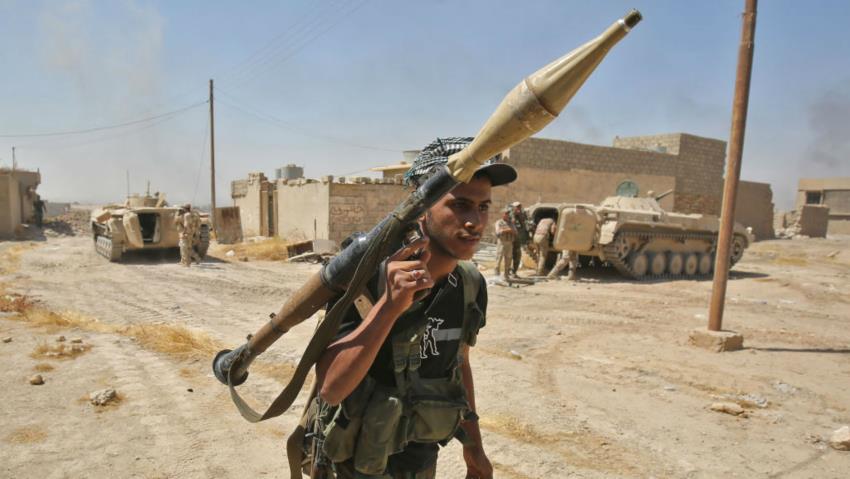The organisation's further induction in March to the Iraqi military forces granting them equal rights to other security forces, has failed to quell the debate around core issues within and outside the organisation.
In November 2016, The Iraqi parliament passed a bill recognising the official role of the PMU - an umbrella organisation dominated by Shia paramilitary groups - as a government entity operating alongside the military.
The PMU rose in 2014, after it was formed to fight IS, and has since had long-standing interactions and overlap with the Iraqi state in the framework of the anti-terrorism campaign.
The progressive institutionalisation of the organisation within the state apparatus has raised much controversy. "The PMU law has until now not been signed by parliament and has not been included in the 2018 budget, " highlights Hashemi.
Another issue dividing groups within the PMU pertains to the consolidation of the organisation within the security forces. "Some, such as the group Assaib Ahl Haq (AAH) believe it should remain an autonomous organisation (falling directly under the office of the Iraqi prime minister) as is currently the case.
"Others, such as Saraya Salam argue that it should be integrated at the level of the defense and interior ministries", explains Hashemi. This view is shared by sheikh Mazin Tamimi, a commander wthin the PMU affiliated to the Shia marjaiya, the highest Shia religious authority in Iraq led by Sayed Ali Sistani.
In December of last year, Sayed Sistani had already urged Shia paramilitary groups to incorporate into state security bodies, underlining that weapons used to fight IS should also be brought under the control of the Iraqi government.
Hashimi recognises that some factions within the pro-Iran PMU have been reluctant to relinquish heavy weaponry such as Abrahms tanks that are still in the hands of Kataeb Hizballah .
"In addition, weapons bought from Iran and paid for by the government should also remain in the hands of some of these factions," says Hashemi.
The Iraqi expert underlines that some of the PMU have also refused to hand barracks over to the state and failed to provide the government with any oversight on their prisons.
For Hashemi, the crux of the problem resides nonetheless in the fact that some factions show greater loyalty to their factions and leaders than the state.
Affiliation to powerful groups can also determine how much money and training PMU members get. Sheikh Mazen Tamimi, a commander in the Marjaiya PMU who is affiliated to the Iraqi religious Shia authority complains that the majority of the 22,000 Marjaiya fighters have yet to be paid.
"We have brought the issue officially to the ministry council, which has agreed that we should be paid but we are still waiting," says Sheikh Mazen. The various factions within the PMU, mainly the pro-Iran factions and the pro-marjaiya or Sadar factions also disagree about the organisation's transnational activity.
Hashimi explains that about 8,000 fighters from pro-Iranian factions integrated to the PMU are currently engaged in Syria mainly from Kaateb Hizballah, Harakat Nujabaa, Assaib Ahl Haq, the Badr organisation, Sayed Shuhada, among many others. "My personal opinion is that that Iraqi forces should not be fighting in Syria," says Sheikh Safaa al-Tamimi.
These problems make the consolidation of the PMU into one homogenous a group a complicated task for the Iraqi government. But ironically, they make it equally difficult for Iran to turn the PMU into a subservient replica of the Iranian Revolutionary Guards in Iraq, a project Tehran has been accused of working on diligently.
The evolution of the PMU will nonetheless greatly hinge on who the next prime minister of Iraq is, the vision he has of the organisation, and what constraints he is willing or able to impose.
Source: www.alaraby.co.uk/english/comment/2018/4/20/a-problematic-pmu-in-iraq


 RSS Feed
RSS Feed